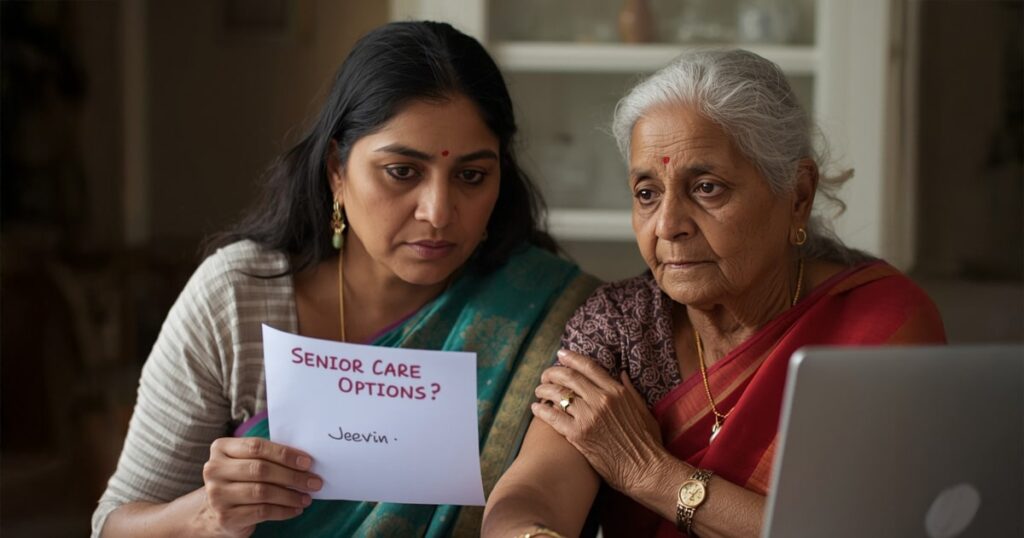By the time you’re in your late 40s or 50s, you’re expected to have it all figured out: a stable job, grown-up kids, and ageing parents who now, unexpectedly, need you as much as you once needed them.
But no one really prepares you for how hard this balancing act can be.
If you’re part of the growing “sandwich generation,” you’re not alone. Many of us are quietly drowning under work deadlines, Zoom calls, and late-night emergency room visits—trying to hold it all together with a brave face and a tired heart.
It’s the story of being emotionally stretched, physically exhausted, and in desperate need of support.
The Reality No One Talks About
India’s population is ageing rapidly. With medical advances, our parents are living longer—but often with chronic illnesses or mobility challenges. And while love drives us to care for them, the “how” remains painfully unclear.
You’re working full-time. Your phone rings mid-meeting—it’s home. Dad’s blood sugar has dropped. Mom has had a fall. You excuse yourself again. That promotion? It’ll wait. Your parent can’t.
There’s no rulebook. Just guilt, worry, and the feeling that somewhere—either at work or at home—something is always falling through the cracks.
The Pressures You Face (and Why It’s Okay to Feel Overwhelmed)
- Time Isn’t Yours Anymore
Your day begins with medication reminders, helping with hygiene, and maybe squeezing in a doctor’s appointment before logging in for work. Nights bring uncertainty—will there be a 2 AM emergency? - Workplace Strain
You try to remain the focused, dependable professional you once were. But caregiving bleeds into your job. Meetings are missed, networking is skipped, and leadership opportunities quietly pass you by. Saying “I’m a caregiver” still feels risky, like an admission of weakness. - The Emotional Tug-of-War
Guilt becomes your constant shadow. Are you doing enough at work? Enough at home? You haven’t seen friends in months. You don’t remember the last time you truly relaxed. And the worst part? Society teaches you that this is just how it is. - Money Matters
Healthcare expenses add up—medications, attendants, specialised diets, emergency trips. You might be dipping into savings or sacrificing career growth. And if siblings aren’t contributing? That adds a quiet, persistent ache. - Family Tensions
Everyone has opinions, but not everyone steps up. Debates over “what’s best for Ma” can get ugly. Sibling dynamics shift, and often, the load falls on one person—emotionally and physically.
10 Ways to Stay Sane and Support Your Parents
- Prioritize Ruthlessly
Not everything needs your attention. Focus on tasks where your presence makes the biggest difference—at home and at work. - Create a Steady Routine
Begin your day with a grounding ritual—tea in silence, a short walk, or prayer. Schedule caregiving tasks into specific time slots. Use shared calendars with siblings or domestic help to coordinate care. - Communicate with Your Workplace
You’re not weak for needing support. Speak to HR. Explore flexible hours, remote work, or caregiver leave (yes, some Indian companies are catching on). You’ll be helping yourself and paving the way for others. - Share the Load
Call a family meeting. Divide responsibilities. One person can handle appointments, another finances. Even a cousin can pitch in with errands. This is a shared legacy, not a solo act. - Embrace Smart Tech
Use apps like Medisafe for meds, Google Keep for checklists, or Practo for doctor visits. Install fall sensors, video doorbells, or cameras for safety. Even voice assistants like Alexa can help remind your parents to hydrate or take medication. - Protect Your Mental Health
You can’t pour from an empty cup. Spend 10 minutes daily on deep breathing, journaling, or a mindfulness app. If things feel overwhelming, talk to a therapist. That’s not weakness—it’s wisdom. - Find Your Support Tribe
You are not alone. From WhatsApp groups to Reddit threads and Facebook communities, there are others walking the same road. Vent, share, laugh, learn. - Make the Home Safer
Install grab bars, anti-slip mats, and keep essentials within reach. Post emergency numbers in visible spots and ensure medical info is ready to go. - Have a Plan B
Keep a list of nearby hospitals, backup caregivers, and helpful neighbours. Prepare a go-bag with meds, insurance, and ID cards. Save a few leave days for surprises. - Know When to Get Help
In India, we often equate caregiving with doing everything ourselves. But sometimes, choosing assisted living or memory care is the most loving thing you can do. Places like Avana and Athulya are offering excellent care and safety—freeing you to be the child again, not just the caregiver.
Let’s Talk About the Elephant in the Room
Caregiving in India carries invisible cultural weight. Daughters-in-law or eldest sons are often expected to shoulder the entire burden. And assisted living? Still taboo in many households.
But things are changing. Communities like Avana Senior Care and Athulya are redefining senior care with dignity and compassion. More and more families are embracing a middle path—honouring their parents without sacrificing their own lives.
We must normalize asking for help. We must celebrate caregivers who set boundaries.
Mistakes to Avoid
- Believing “Love = Doing Everything Yourself”
- Ignoring your own physical and emotional health
- Waiting for burnout before seeking help
- Not planning finances early on
- Avoiding tough conversations—with family and your employer
Conclusion: Caregiving Is Not a Task. It’s an Act of Grace.
It’s messy. It’s beautiful. And it’s deeply human.
You’re doing something extraordinary—holding space for a parent while juggling a job, a home, and your own well-being.
Yes, you’ll stumble. You’ll cry in stairwells. You’ll forget meetings. But you’ll also witness moments of profound connection—a smile, a story, a hand held in silence.
So take heart. Breathe deeply.
You’re not alone. And you’re doing far better than you think.

